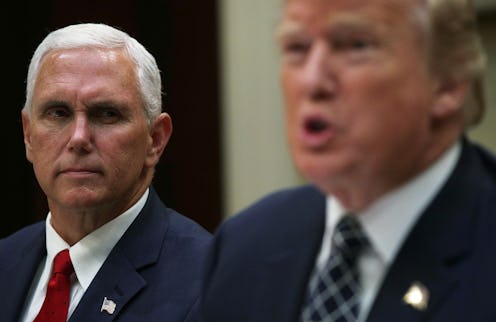News
How This Obscure Rule Could Empower Mike Pence To Impeach Trump

When a Yale psychiatrist warned recently that President Trump is suffering a cognitive collapse, critics of the president began wondering if it might be time to dust off the 25th Amendment. Although it's never been used, there's an obscure section of that amendment that allows certain members of government to kick a president out of office an impeachment vote in Congress. It's true that under the right circumstances, the 25th Amendment could end Trump's presidency — if Mike Pence and Congress get on board.
Politico reported Wednesday that in December, lawmakers from both parties summoned a Yale psychiatry professor to Capitol Hill to brief them on Trump's mental state. The professor, Dr. Bandy X. Lee, reportedly told legislators that Trump is "falling apart under stress," is "going to get worse" and will eventually "become uncontainable with the pressures of the presidency."
"He's going to unravel, and we are seeing the signs," Lee said, according to Politico.
Lee's comments set off alarm bells in Washington, and quickly led some to wonder if maybe, for the good of the country, other members of Trump's administration might be willing to invoke the 25th Amendment. The relevant text in Section 4 reads:
Whenever the Vice President and a majority of either the principal officers of the executive departments or of such other body as Congress may by law provide, transmit to the President pro tempore of the Senate and the Speaker of the House of Representatives their written declaration that the President is unable to discharge the powers and duties of his office, the Vice President shall immediately assume the powers and duties of the office as Acting President.
In other words, the members of a president's cabinet — the Attorney General, Transportation Secretary, and so forth — have the power to remove their boss from office if they've determined that the president is unfit for office. It's pretty simple: If a majority of cabinet members and the vice president formally declare the president unfit to serve, the vice president immediately becomes acting president (although not necessarily the permanent president, as we'll see).
The 25th Amendment is appealing to Trump critics for several reasons. Unlike impeachment, it doesn't require a vote in Congress. It's also very open-ended, as the phrase "unable to discharge the powers and duties" could refer to any number of circumstances — including, some have argued, a president suffering from a mental decline.
"[Trump's] incapacity to really govern, to truly execute the serious duties that fall to him to carry out, is nevertheless testified to daily — not by his enemies or external critics, but by precisely the men and women whom the Constitution asks to stand in judgment on him, the men and women who serve around him in the White House and the cabinet," conservative columnist Ross Douthat wrote in a May article in which he called for the 25th to be invoked.
If the majority of Trump's cabinet does want to remove him, however, they'll face two obstacles. The first is Pence, who would have to sign off on any invocation of the 25th Amendment before it took effect.
And even if Pence agreed, Trump wouldn't necessarily be removed from power permanently, thanks to an even lesser-known provision of the amendment in question. If a vice president and cabinet invoke the 25th amendment to declare a president unable to serve, Congress has to certify that declaration by a two-thirds vote in both chambers. If it fails to do so, the original president goes back to being president.
This is a very, very high bar. In fact, it's higher than the bar for impeachment, which requires a two-thirds vote in the Senate but only a simple majority in the House of Representatives. The entire appeal of the 25th Amendment is that it allows a government to remove a president from office without passing articles of impeachment —and yet this is largely a distinction without a difference, given that Congress has to approve any invocation of the 25th.
At the end of the day, the Constitution is designed to make it extremely difficult for a president to be removed from office without the support of either Congress or the voting electorate. The 25th Amendment isn't an exception to this rule — it's part of it.